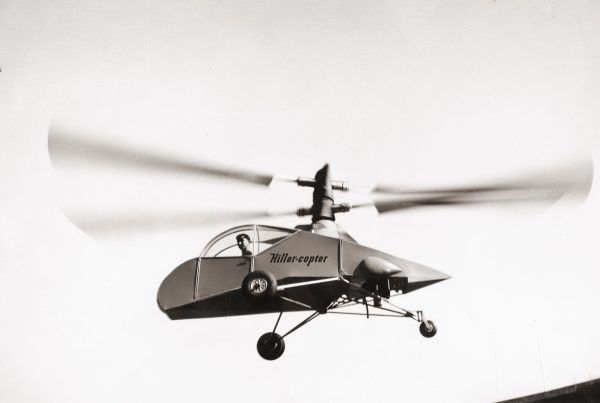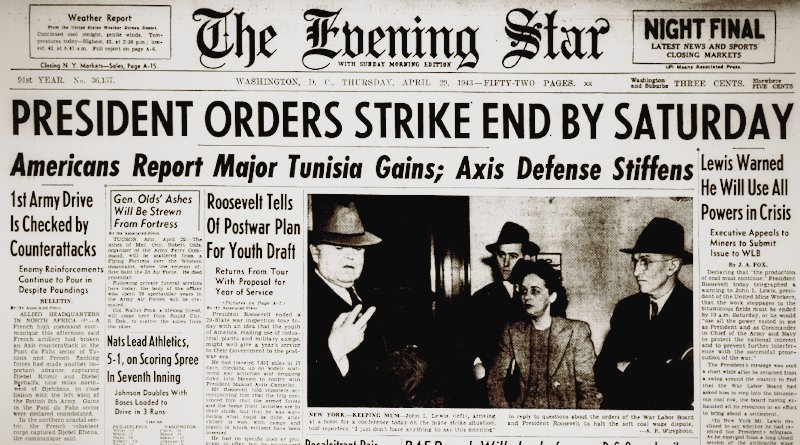World War II Chronicle: April 29, 1943
American pilots have figured out how to attach 1,000-lb. bombs to their P-40 fighters and are now pulverizing their Japanese targets in Burma (see page three)… Meanwhile, on page six we learn the commanders of the China-Burma-India Theater are in Washington to confer with Secretary of War Henry Stimson… Helicopters — or “helicoptors” in the article — were still a brand-new concept in 1943, Igor Sikorsky having first flown one that was still tethered to the ground in 1939. Page six also reports that the U.S. government has awarded shipbuilder Henry Kaiser a contract to build “airplane that can stand still or fly backward.” The machine he likely has in mind is a design by a teenager named Stanley Hiller named the “Hiller-Copter.”

George Fielding Eliot column on page eight… Yesterday we noted the passing of Maj. Gen. Robert Olds and on Tuesday another general had died at Walter Reed Hospital. Brig. Gen. Frank D. Lackland (bio here) had retired last year and becomes the namesake of Lackland Air Force base in 1947… Page 26 tells of two Marines who volunteered to take out four enemy pillboxes on Guadalcanal. They took a whole lot of guts, a few grenades, and fortunately for them luck tagged along…
Recently we read a warning from an outspoken officer that the war could drag on for decades if we don’t get the right equipment in the right hands quickly, as the Japanese will consolidate their captured territory. On page 32 we have a U.S. senator warning the same thing. Bear in mind that while we view this war with the benefit of hindsight, they lived in a world of purely conventional weaponry. Had it not been for a top-secret weapon currently under development, the United States and Japan could have fought each other for a lot longer, with many millions of casualties. Looking ahead from the end of April we still had a very long and bloody war ahead of us…

Sports begins on page 44, which reports that former Major League catcher Mickey Cochrane’s Great Lakes Navy baseball team will play the World Champion St. Louis Cardinals on Monday. Also mentioned is hard-hitting Montreal Royals prospect Jack Graham. The son of former catcher Peaches Graham gets called up to the Army Air Force before he makes it to the Brooklyn Dodgers. He has a decent rookie year in 1946, playing 102 games for Brooklyn and the New York Giants. Graham returns to the majors as the St. Louis Browns’ starting first baseman in 1949, hitting 24 home runs and knocking in 79 runs. He had a distinguished minor league career, hitting 354 home runs…
The “Torpedo 8” story continues on page 53.
Roving Reporter by Ernie Pyle
NORTHERN TUNISIA — We moved one afternoon to a new position just a few miles behind the invisible line of armor that separates us from the Germans in Northern Tunisia. Nothing happened that first night that was spectacular, yet somehow the whole night became obsessed with a spookiness that leaves it standing like a landmark in my memory.
We had been at the new camp about an hour and were still setting up our tents when German planes appeared overhead. We stopped work to watch them. It was the usual display of darting planes, with the conglomerate sounds of ack-ack on the ground and in the sky.
Suddenly we realized that one plane was diving straight at us, and we made a mad scramble for fox holes. Two officer friends of mine had dug a three foot hole and set their tent over it. So they made for their tent, and I was tramping on their heels. The tent flap wouldn’t come open, and we wound up in a silly heap. Finally it did open, and we all dived through the narrow opening all at once.
We lay there in the hole, face down, as the plane came smack overhead with a terrible roar. We were all drawn up inside, waiting for the blow. Explosions around us were shatteringly loud, and yet when it was all over we couldn’t find any bomb holes or anybody hurt.
But you could find a lot of nervous people.
Dusk came on, and with dusk began the steady boom of big guns in the mountains ahead of us. They weren’t near enough for the sound to be crashing. Rather it was like the lonely roll of an approaching thunderstorm — around which since childhood has always made me sad with a kind of portent of inevitable doom.
We went to bed in our tents. A nearby farmyard was full of dogs and they began a howling that lasted all night. The roll of artillery was constant. It never stopped once in 24 hours. Once in a while there were nearer shots which might have been German patrols or might not.
We lay uneasily in our cots. Sleep wouldn’t come. We turned and turned. I snapped on a flashlight.
“What time is it?” asked Chris Cunningham from the next cot.
“Quarter to one,” I answered. “Haven’t you been asleep?”
He hadn’t.
A plane droned faintly in the distance and came nearer and nearer until it was overhead.
“Is that a Jerry or a Beaufighter,” Chris asked out of the darkness.
“It hasn’t got that throb-throb to it,” I said, so it must be a Beaufighter. But hell, I never can tell really. Don’t know what it is.”
The plane passed on, out of hearing. The artillery rolled and rolled. A nearer shot went off uncannily somewhere in the darkness. Some guinea hens set up a terrible cackling.
I remembered that just before dusk a soldier had shot at a snake in our new camp, and they thought it was a cobra. We’d just heard our first stories of scorpions, too. I began to feel creepy and wondered if our tent flaps were tight.
Another plane throbbed in the sky, and we lay listening with an awful anticipation. One of the dogs suddenly broke into a frenzied barking and went tearing through our little camp as though chasing a demon.
My mind seemed to lose all sense of proportion, and I was jumpy and mad at myself.
Concussion ghosts, traveling in waves, touched our tent walls and made them quiver. Ghosts were shaking the ground ever so lightly. Ghosts were stirring the dogs to hysteria. Ghosts were wandering in the sky peering for us in our cringing hideout. Ghosts were everywhere, and their hordes were multiplying as every hour added its production of new battlefield dead.
You like and think of the graveyards and the dirty men and the shocking blast of the big guns, and you can’t sleep.
“What time is it?” comes out of darkness from the next cot. I snap on the flashlight.
“Half past 4, and for God’s sake go to sleep!”
Finally just before dawn you do sleep, in spite of everything.
Next morning we spoke around among ourselves and found one by one that all of us had tossed away all nigh. It was an unexplainable thing. For all of us had been through dangers greater than this. On another night the roll of the guns would have lulled us to sleep.
It’s just that on some nights the air becomes sick and there is an unspoken contagion of spiritual dread, and you are little boys again, lost in the dark.
Click here for TODAY’S NEWSPAPER
Evening star. (Washington, D.C.), 29 April 1943. Chronicling America: Historic American Newspapers. Lib. of Congress.
https://chroniclingamerica.loc.gov/lccn/sn83045462/1943-04-29/ed-1/
